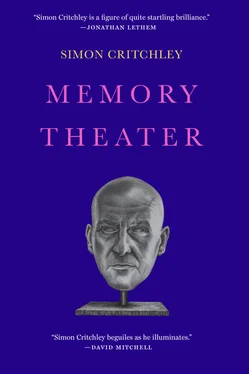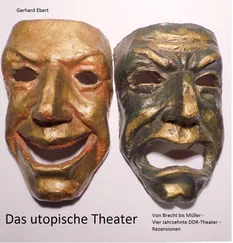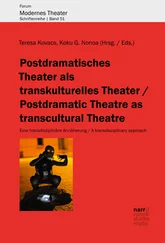Poetry lets us see things as they are. It lets us see particulars being various. But — Michel insisted — poetry lets us see things as they are anew. Under a new aspect. Transfigured. Subject to a felt variation. The poet sings a song that is both beyond us, yet ourselves. Things change when the poet sings them, but they are still our things: recognizable, common, near, low. We hear the poet sing and press back against the pressure of reality. I instantly thought that many of these texts could have been published, if I could have interested the increasingly flagging and beleaguered French and Anglophone academic presses. But such plans soon seemed irrelevant.
Michel had a small cult following in France and the United States, but lacked the capacity for endless and shameless self-promotion that most often defines philosophical fame. Michel slipped into his pajamas around 10:30 p.m. and slept like the dead, thanks to the chemical kindness of his liberal doctor and an understanding pharmacist. While sometimes spotted with moments of brilliance, his talks in English were usually long, rambling, and incoherent. He also often seemed to lose interest in what he was saying.
In the Aquarius box, I found many strange maps. Michel had somehow obtained an annotated cloth print of the Mappa Mundi from Hereford Cathedral. This extraordinary object from around 1300 presents the world divided into three continents (Europe, Asia, Africa) with its center in Jerusalem, which looked like a keyhole. I came across a series of almost fantastical antique maps of Australia, or more precisely New Holland, seemingly drawn by French explorers from the early to mid-1700s. There were hand-drawn maps of the estuarial systems of Virginia and North Carolina, combined with exhaustive descriptions of flora and fauna. Most impressive of all was Michel’s own six feet by four map of natural catastrophe, with extensive detail on the paths of hurricanes in the Caribbean and the Gulf of Mexico, the tornadoes of the American Midwest, maps of volcanic explosions from Vesuvius to Krakatoa and beyond. There was also a detailed prose description of the meteorite the size of Manhattan that allegedly fell on the Yucatán Peninsula fifteen million years ago, wiping out most forms of life on earth, including all dinosaur species.
In the Gemini box, I discovered heavily annotated copies of the 900 Theses or Conclusions of Pico, and drafts of commentaries on Marsilio Ficino’s translations of Plato, especially Symposium , and Tommaso Campanella’s City of the Sun (Michel was obsessed with the description of the ideal city with its religion based on a solar cult. Oddly, when we were together in Italy in those summers, he always avoided the sun). I also found a series of fragmentary but fascinating drafts for a study of the technological metaphors in Heidegger’s Sein und Zeit , with deeply original insights on Heidegger’s obvious references to hands, hammers, nails, and the workshop world of fundamental ontology, but less obvious references to car indicators, washing machines, typewriters, radio signals, and even primitive computer systems: “For there too the gods are present,” Heidegger would seem to be suggesting. I came across transcribed notes from a number of sessions of a Heidegger reading group that took place informally at the ENS in the early 1960s and which included Michel, his great friend Dominique, and a young Jacques Derrida, as well as a number of visiting Americans. I remember Michel telling me about this group, which was apparently almost covert during the overwhelming hegemony in Paris in those years of what was called “ le Freudo-Marxisme ,” the intoxicating Gallic cocktail of Leninism and libidinism that was particularly popular at the time.
In Gemini , I also found a short, odd text — written in English — called “The One True Philosophy of Clothes.” It was anonymous, but my guess is that it was written by Michel’s American wife, Elizabeth, who worked for many years in the Paris fashion industry, a job that she had great difficulty combining with her immense passion for Ibsen, Racine, and Attic tragedy, especially Euripides. The consequence of this collision was satire and the model was Thomas Carlyle’s Sartor Resartus , “The Tailor Re-tailored.” She begins by writing,
What is the human being but a garment and what is the world but the living garment of God? If language is the expressive garment of thought, then clothes are the expressive garment of the body. Nature and life itself are but one garment woven and ever-weaving from the loom of time. As Carlyle writes, “The whole external universe and what holds it together is but clothing and the essence of all science lies in the PHILOSOPHY OF CLOTHES.”
The philosophy of clothes is not some specialized sub-discipline taught in fashion schools. It is the key to understanding everything. It is the germ and gem of all science. The human being is the fashioned animal and fashion is the key to understanding the human being. Let me put this in a simple linguistic formula: Mankind = manikin = mannequin. Like Plato’s demiurge or creator-deity in the Timaeus , the fashion designer takes the old rags of matter and forms them into something sublime. God is the great fashion designer in the sky and the fashion designers here on earth are his prophets, his true disciples: mortal portals to his immortal power.
Not bad. My mind wandered. I thought of Adam and Eve after the Fall, discovering their nakedness and clothing themselves. Were they naked before the Fall? No. They may have been nude, but not naked. For they wore the garment of God’s grace, the radiant garment of glory. With the exit from Paradise, to cover our shame, we wear either the penitential skins of wild animals or the many-colored robes of vanity. But this is mortuary clothing, funereal dress until we put on the white robes of baptism. I looked down at my feet. Did they wear flip-flops in Paradise?
My first job was working as a researcher in what used to be called University College Cardiff for a prominent biologist, Russell Lloyd; I suppose that today he would be called a neuroscientist. He had become obsessed with the history of research on the nervous system and needed a humanist who could do archive work. It was infinitely dull, but I got paid and it led me to Freud’s early research on the testicles of eels and Georg Büchner’s paper on the skull nerves of fish and from there into his dramatic works, especially Danton’s Death . Prophetic.
When in Cardiff I received a letter from Michel telling me that his wife had left him for an English civil engineer. She was living somewhere in South Wales and apparently having a tough time. Apparently, she had become enamored with the engineer (whom I never met. Was he called Simon?) during choir practice in an Anglican church in Paris. How odd. Elizabeth and I met on a few occasions and had some memorable long walks in the countryside outside Cardiff, where she lived, usually in drizzle. She explained in an astonished, French-inflected, New England, Anne Sexton — like accent that her new neighbors had not even heard of Anna Karenina let alone read it. Can you imagine? During the last of those walks, she was visibly pregnant. I left Cardiff soon afterwards for my first teaching post and we completely lost touch. I think she changed her name. I often think about that child.
But nothinghad prepared me for what I found in the Aries box. Michel had written a long text from the late 1960s, maybe around ’67 or ’68, on Hegel called “Le théâtre de mémoire selon G.W.F. Hegel,” an apparently entirely original interpretation of Hegel’s monumental 1807 book. The basic idea of the memory theater was borrowed from the highly influential writings of the London-based art historian Frances Yates and in particular her 1966 book The Art of Memory .
Читать дальше












